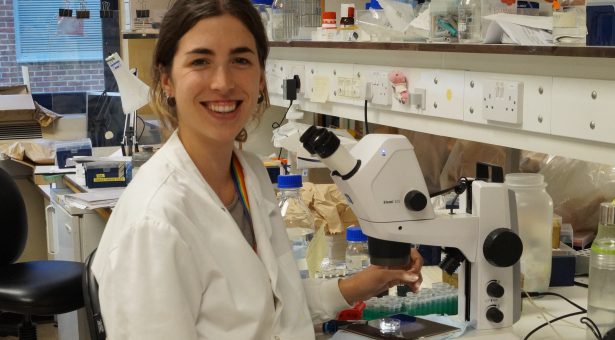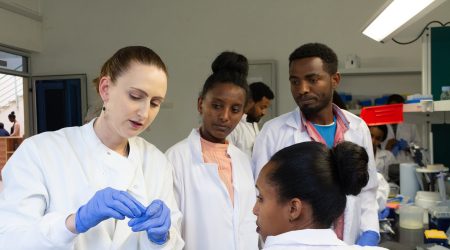Erasmus experience to a plant science PhD; Introducing Marina Millan-Blanquez

Marina Millán Blánquez is a third year PhD student working on bread wheat female fertility. She previously carried out an Erasmus+ Traineeship Program in Professor Cristobal Uauy’s group before choosing to pursue a PhD here at the John Innes Centre.
We spoke to Marina about her experience of the Erasmus+ programme, and found out more about her research project and working at the John Innes Centre.
“I was born in Almería, one of the most beautiful places in Spain, which is covered in greenhouses growing all kinds of vegetables. I grew up seeing what agriculture means for my hometown.
My curiosity for plant sciences also comes from my dad. He studied agronomy and worked across these greenhouses advising farmers on the best practices to fight pests.
After high school I went to the Autonomous University of Barcelona to study a BSc in genetics. I chose genetics because I wasn’t sure about what to dedicate my life to. I thought genetics would open the door to different research areas. To my surprise the genetics course didn’t cover plants at all, which increased my interest in plant sciences even more. I realised that if I wanted to learn more about plant genetics, I had to discover it myself.
To do this I carried out two internships, one in Almería working on courgettes and another one in Barcelona working on melon fruits. I had a great time working in the lab and glasshouses that I decided to continue researching plants, but now somewhere abroad.
While working in Barcelona, my supervisor told me he did his PhD with Professor Cristobal Uauy at the University of California, Davis, now based at the John Innes Centre. Through this connection I was offered a project through the Erasmus+ Programme, the EU’s programme to support education, training, youth and sport in Europe.
The Uauy group works on wheat genetics focusing on yield and quality-related traits.
My Erasmus project focused on characterising a gene responsible for grain size in wheat, supervised by Dr. Jemima Brinton, a former Postdoctoral Researcher in the lab.
During those months, I learnt the importance of research in wheat genetic and all the incredible resources that are now available for the scientific community in this field.
Working at the John Innes Centre during my Erasmus+ internship gave me the opportunity to ask PhD students about their experiences of doing a PhD. There are a lot of PhD students at the John Innes Centre, and across the Norwich Research Park, which helps in not feeling isolated when you first start here.
I also realised how important it is knowing where and with whom you want to do your PhD. You’re going to spend four years in an institute and research group you might not know, and that can be scary, but the Erasmus+ internship turned out to be extremely helpful in in figuring out whether I would fit into the team or not.
I felt motivated and fully prepared to move to the next step, a PhD in wheat genetics. I applied for a PhD in Crop Genetics here at the John Innes Centre with Dr Scott Boden.
I believe the Erasmus+ internship put me in a really good position when I applied because it gave me great networking opportunities and experience in a research environment.
Shortly after I started my PhD, Scott moved back to Australia to start a new position at the University of Adelaide. We agreed that I would stay at the John Innes Centre and Cristobal would co-supervise my PhD project, as they work in similar research areas. At first I was sad thinking I had lost a supervisor, but actually, I gained one instead.
My PhD project investigates the development of the unpollinated wheat stigma and its receptivity to pollen, traits that are key in limiting the fertile period of the flower. The stigma of flowering plants is described as the female part of the flower that receives pollen and provides the right conditions for the pollen grain to germinate. Once the pollen reaches the ovule, the seed will form. The life span of the stigma determines the time window in which pollination, fertilization, and seed development can occur.
In hybrid wheat production, where wheat plants are either male or female, seed development in the female parent relies on cross-pollination from the male parent.
There is heterosis in wheat, hybrids show higher and more stable yields than conventional lines, but hybrid wheat seed remains expensive to produce, and this limits its adoption by the farmer.
If we want to improve cross-pollination in wheat, different aspects of its floral biology need to be changed. One option would be to extend the period in which the stigma is receptive and able to support pollen germination.
This is the aim of my PhD, which is in collaboration with the breeding companies KWS and Syngenta who have provided me with female wheat cultivars to work on.
At the moment, I’m using a combination of approaches, ranging from field trials and microscopy work to machine learning and transcriptomics to understand the genetic mechanisms that control stigma receptivity and lifespan in wheat. I hope to contribute not only to the commercialisation of hybrid wheat but also to advance our understanding of female fertility in plants.
I am very grateful to all the fantastic people at the John Innes Centre including Lewis from Horticultural Services for taking good care of my wheat plants, Darryl and his wonderful Field Trials team for their endless help in the field, Sergio in the Bioimaging Platform for teaching me microscopy techniques, the Uauy lab of course, and many more that make this an amazing place to work.
I am still not sure about what I would like to do after I finish my PhD, for now I’ll keep on enjoying this rollercoaster ride.”
Marina’s PhD was supported by the UKRI Biotechnology and Biological Sciences Research Council Norwich Research Park Biosciences Doctoral Training Partnership [Grant number BB/M011216/1] as a CASE Award in collaboration KWS and Syngenta
As the UK is no longer an EU member country, only certain elements of ERASMUS+ are available to UK students or students wishing to do a placement in the UK.
The Turing Scheme is the UK’s global programme for studying, working and living abroad, offering opportunities for personal and professional development for UK-based students.



